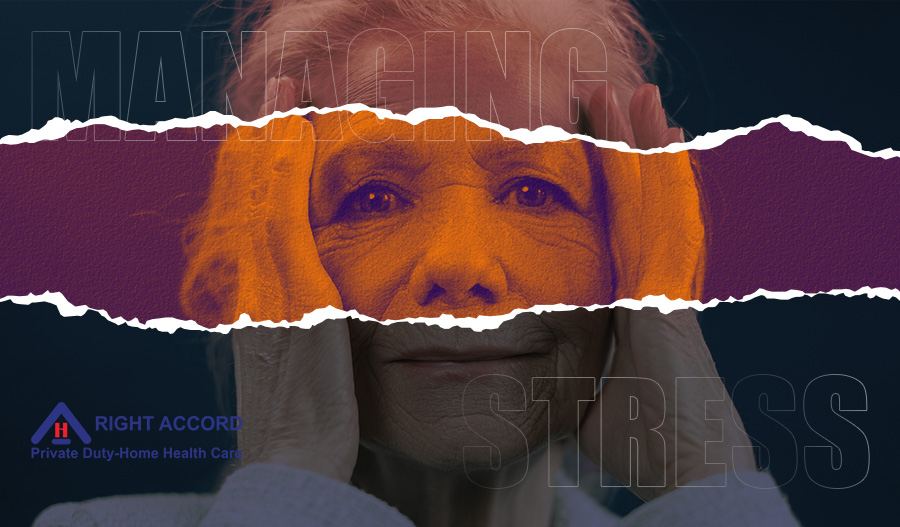· 6 min read
5 Simple Techniques to Help Seniors Manage Stress
This Blog will explore the 5 simple techniques that can help seniors discover how they can take control of their stress levels and live their best life.

By: Rosemarie Tamunday Casanova — RN, BSN, MHA
As we age, stress management can become increasingly challenging. April is National Stress Awareness Month, and it’s important to recognize the impact stress can have on seniors.
From physical symptoms like headaches and muscle tension to emotional symptoms like anxiety and depression, stress can take a toll on our overall well-being. But, the good news is that there are simple techniques that seniors can use to manage stress and improve their quality of life.
In this article, we’ll explore five techniques that can help seniors reduce stress levels and find peace amidst the chaos. Whether you’re a senior looking to improve your stress management skills or a caregiver seeking tips to support your loved one, these techniques are easy to implement and can make a world of difference. So, let’s dive in and discover how seniors can take control of their stress levels and live their best life.
Causes and Effects of Stress Among Seniors

Photo by T Leish on Pexels
Stress is a natural response to challenging or difficult situations that we encounter in our daily lives. However, when stress becomes chronic or prolonged, it can have serious negative effects on our physical and emotional health.
Seniors are particularly susceptible to stress due to a variety of factors, including retirement, loss of loved ones, declining health, and financial concerns.
Chronic stress can lead to a range of health problems, including heart disease, high blood pressure, and depression. Therefore, it’s essential for seniors to manage their stress levels effectively.
One of the most common causes of stress among seniors is the feeling of being alone or disconnected from others. This can be due to the loss of a spouse or close friends, or simply the fact that many seniors live alone. Social isolation can lead to feelings of depression and anxiety, which can exacerbate stress levels. Another common cause of stress among seniors is financial insecurity. Many seniors live on a fixed income, and the rising cost of healthcare and living expenses can be a source of constant worry.

Photo by Andrea Piacquadio on Pexels
5 Simple Stress Management Techniques for Seniors
Fortunately, there are many simple techniques that seniors can use to manage their stress levels and improve their overall well-being. Let’s take a closer look at five effective stress management techniques for seniors.
1. Mindfulness Meditation
Mindfulness meditation is a simple yet powerful technique that can help seniors reduce stress levels and improve their overall well-being. This technique involves focusing your attention on the present moment and cultivating a sense of awareness and acceptance. By practicing mindfulness meditation regularly, seniors can learn to be more present and less reactive to stressful situations. This can lead to a greater sense of calm and peace, even in the midst of challenging circumstances.
To practice mindfulness meditation, find a quiet and comfortable place to sit or lie down. Close your eyes and focus your attention on your breath. Notice the sensation of the breath as it enters and leaves your body. If your mind begins to wander, gently bring your attention back to your breath. Start with just a few minutes of meditation each day and gradually increase the length of your sessions as you become more comfortable with the practice.
2. Deep Breathing Exercises
Deep breathing exercises are another simple and effective technique for managing stress levels. This technique involves taking slow, deep breaths and focusing on the sensation of the breath as it enters and leaves your body. By slowing down your breathing and focusing your attention on the present moment, you can reduce feelings of anxiety and tension.
To practice deep breathing exercises, find a quiet and comfortable place to sit or lie down. Close your eyes and take a slow, deep breath in through your nose. Hold the breath for a few seconds, then slowly exhale through your mouth. Repeat this process several times, focusing on the sensation of the breath as you inhale and exhale.

Photo by Kampus on Pexels
3. Physical Exercise and Yoga
Physical exercise and yoga are both excellent ways to reduce stress levels and improve overall well-being. Exercise releases endorphins, which are natural mood-boosters that can help reduce feelings of stress and anxiety. Additionally, yoga combines physical movement with mindfulness techniques, making it a powerful tool for managing stress in seniors.
To incorporate physical exercise and yoga into your daily routine, start slowly and gradually increase the intensity and duration of your workouts. Choose activities that you enjoy and that are appropriate for your fitness level. Consider enrolling in a yoga class or working with a personal trainer to develop a safe and effective exercise program.
4. Spending Time with Loved Ones
Spending time with loved ones is another effective way to reduce stress levels and improve overall well-being. Social support is essential for seniors, particularly those who may be experiencing feelings of isolation or loneliness. By spending time with friends and family members, seniors can feel more connected and supported, which can help reduce feelings of stress and anxiety.
To stay connected with loved ones, consider scheduling regular phone calls or video chats. Plan social outings or activities that you can enjoy together, such as going for a walk or having a meal together. If you’re feeling isolated or alone, consider joining a social group or community organization to meet new people and make new friends.

Photo by Kampus on Pexels
5. Getting Enough Sleep
Getting enough sleep is essential for managing stress levels and improving overall well-being. Sleep helps our bodies and minds to recover and recharge, allowing us to better cope with the challenges of daily life. However, many seniors struggle with sleep issues, including insomnia and sleep apnea.
To promote healthy sleep, establish a regular bedtime routine and stick to it as much as possible. Avoid caffeine and alcohol in the evening, and limit screen time before bed. Create a comfortable sleep environment that is quiet, dark, and cool. If you’re struggling with sleep issues, talk to your doctor about possible solutions, such as medication or therapy.
Conclusion and Additional Resources for Stress Management
In conclusion, stress management is a critical aspect of overall well-being, particularly for seniors. By incorporating simple techniques like mindfulness meditation, deep breathing exercises, physical exercise, spending time with loved ones, and getting enough sleep, seniors can reduce stress levels and improve their quality of life. It’s essential to recognize the impact of stress on our physical and emotional health and take proactive steps to manage it effectively.
If you’re looking for additional resources on stress management for seniors, consider talking to your doctor, therapist, or a trusted caregiver. You can also check out online resources and support groups like the National Institute of Mental Health and the American Psychological Association. With the right tools and support, seniors can take control of their stress levels and live their best life.



